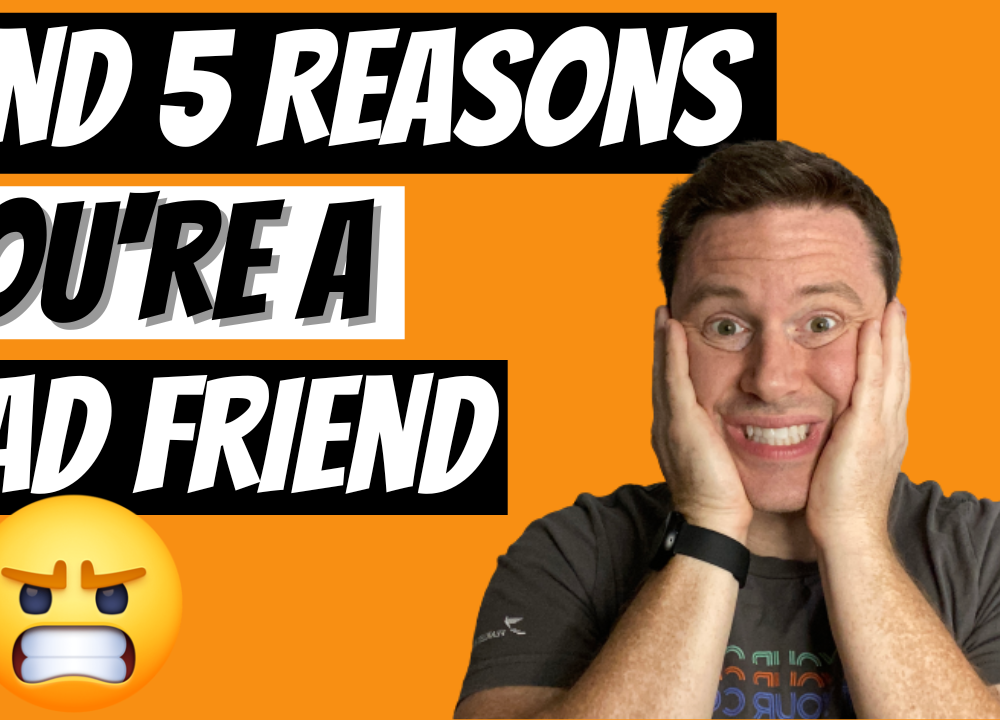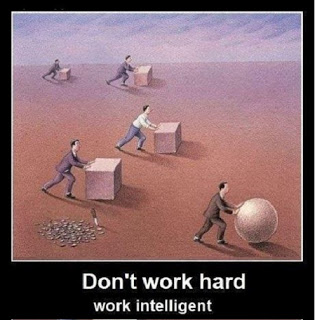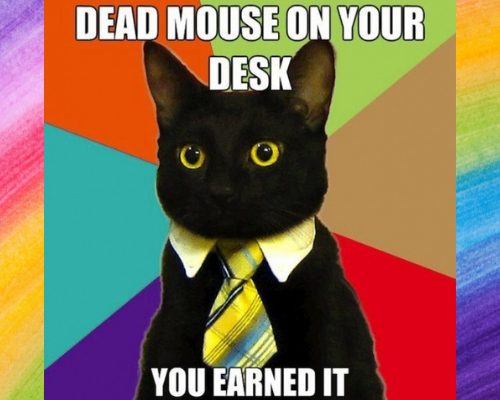I originally wrote the piece below many years ago. And looking back through it, it’s interesting to see my thoughts and perspective at the time. It’s certainly made me think back and reflect and ask myself if I’ve always been a good friend or if I’ve fallen into the traps I mention below.
—
If I asked you, “Are you a good friend?” what would you say? If I asked you, “Are you a bad friend?” what would you say?
One of my personal coaching clients told they wanted to be thought of as a truly, “Good friend.” I shared with them some of the things that I look for in a friend, some of the character traits I try to exhibit so I can be thought of as a good friend, and as well, some of the things I view other people as doing that definitely do NOT make them good friends.
In this video I’m going to take you through five ways on how to be a “Bad friend.” But wait, why would you want to learn that? Because I’m then going to turn that around and give you the counter; five ways on how to be a good friend and how you can improve yourself. This is going to pay huge dividents for you when it comes to your friendships, relationships, and interaction with co-workers.
You may very well even be able to use these suggestions to improve situations in your life such as your job or future job. “How can I be a better friend?” you ask yourself… Here you’ll learn how to do exactly that.
We’ve all been guilty of these at some point or another, myself included. Give yourself an honest look and ask yourself if you exhibit any of the things listed here. It’s never too late to change.
Are you prepared to make the changes necessary to rebrand yourself as a good friend? Are you in search of a way to put aside the past and move forward into being a brand new you? Get started today be implementing these techniques and suggestions.
You will gain a good reputation very quickly once you’re thought of as a good friend, and once you’re thought of as someone whom others can count on.
Above all else: Be kind, have fun, challenge yourself, and remember you have value as a person.
1. You’re Passive Aggressive
I’ll start off this first one with a pretty definitive statement. Passive Aggressiveness is unquestionably the most unattractive, undesirable trait a person can have. Male, female, doesn’t matter. Just as a human being, it’s at the very top of the list. You should pride yourself on having the courage to speak your mind. And if you don’t, your snide, off handed remarks are only cementing the fact that you don’t have that courage.
I used to work for many years in the field of politics and I can’t even count the vast number of times some mid-level manager, with a self-confidence bordering zero made some passive aggressive comment in the office. I can only speak from the man’s perspective here. But from that perspective, there is nothing I view as more of a mark against who is a real man and who isn’t, than those who have no courage of convictions or self-confidence and highlight it by being rude and passive aggressive. It’s about the most cowardly thing you can do and in the long run you’re only hurting yourself by refusing to acknowledge that you have an issue, or issues, you don’t seem able to deal with.
2. You use the phrase, “I’m not sure what I’m doing.”
I haven’t noticed this as much on a personal level with friends to me, but I’ve observed it quite a few times in group settings.
Person A: “Hey I’m planning on doing ______ on Friday, would you like to join me?
Person B: “Oh, I’m not sure what I’m doing. I’ll let you know…”
Let’s name this for what it really is. “I’m not sure what I’m doing” is 100% code for “I’m waiting to see if something better comes along.”
Yes. It is. There’s no way around it. I can hear people arguing now… “But, MY situation is different!”
Possible. But unlikely.
IF (BIG IF) the few exceptions exist where you have to check with your husband/wife because you have to manage a bunch of children on something very specific, or in some other limited case, then maybe, MAYBE you have the occasional out. But I’m guessing this doesn’t apply to you.
Just last week I had one friend ask another friend about attending a show over the summer only to be told, “I’m not sure what I’m doing, I might be going on a trip…”
“okay… so… are you going on a trip or not?” I felt like butting in and asking.
If he wasn’t sure if he was going on a trip, then obviously at that moment he wasn’t going on a trip. And if he made the plans to attend the show, then he wouldn’t be going on the trip because he’d be at the show. Pick a priority buddy. One or the other.
A simple thing like this is VERY common place. But “I’m not sure what I’m doing” is the height of disrespect and tremendously demeaning to the friend who took the time to actually invite you to the activity. Don’t repay his or her kindness by blowing them off in the hope you’ll get a better offer.
If you’ve done this. Its okay. Admit it. Acknowledge it. And change it.
3. You don’t get back to people
I ran a little experiment last month where I reached out to about a dozen people whom I’d helped with something in the past. Friends, and former co-workers. I asked each one to get back to me on a specific question I had or provide me with a quick response back on something I needed help with. Instead of me helping them, this time it was, “Hey this is the one time I actually, genuienly need some help from you…”
Most of them didn’t even bother to return my message.
I don’t believe it’s personally indicative of me or some type of coincidental action against me. Who knows, maybe they all collectively got together and decided to boycott my emails. But rather it’s indicative of them not putting a priority on getting back to someone.
4. You continue to take from people more than you give
My grandmother had a saying, “You should always bring something to a party besides your appetite.” And it stuck with me. Every party or BBQ or picnic I can ever remember, my first question after receiving the invite has always been, “What can I bring?” Even to the point where I’ll sometimes follow it up with, “I know you’re going to say, ‘Nothing’, but I’m going to bring something anyway so you might as well tell me what you could actually use.”
This extends far beyond bringing soda or chips to a BBQ. Whether it’s time or a shoulder to lean on or just the willingness to listen, far, FAR too many people today have set themselves only on what they can take from other people, never considering long enough what they can provide back in return.
Think how much you truly appreciated the last time you were going through a rough point in your life and needed someone to talk to. Or the last time you needed help or advice on a subject you were lost on and along came someone to lend a hand.
You appreciated that right? You felt blessed and grateful that someone gave you their precious time and resources when you had nothing to offer in return. English writer Samuel Johnson is rumored to have said,
“The true measure of a man is how he treats someone who can do him absolutely no good.”
It’s one of those quotes that’s become attributed without official proof it was ever said or written. But regardless of who said it, (some think it was actually first said by Ann Landers), it’s a powerful statement, and it should touch a deep emotion in us on whether we feel compelled to take, take, take from others or whether we’re willing to give back when the situation calls for it.
5. You’re genuinely not dependable
6. You’re unwilling to admit when you’re wrong
Finally



